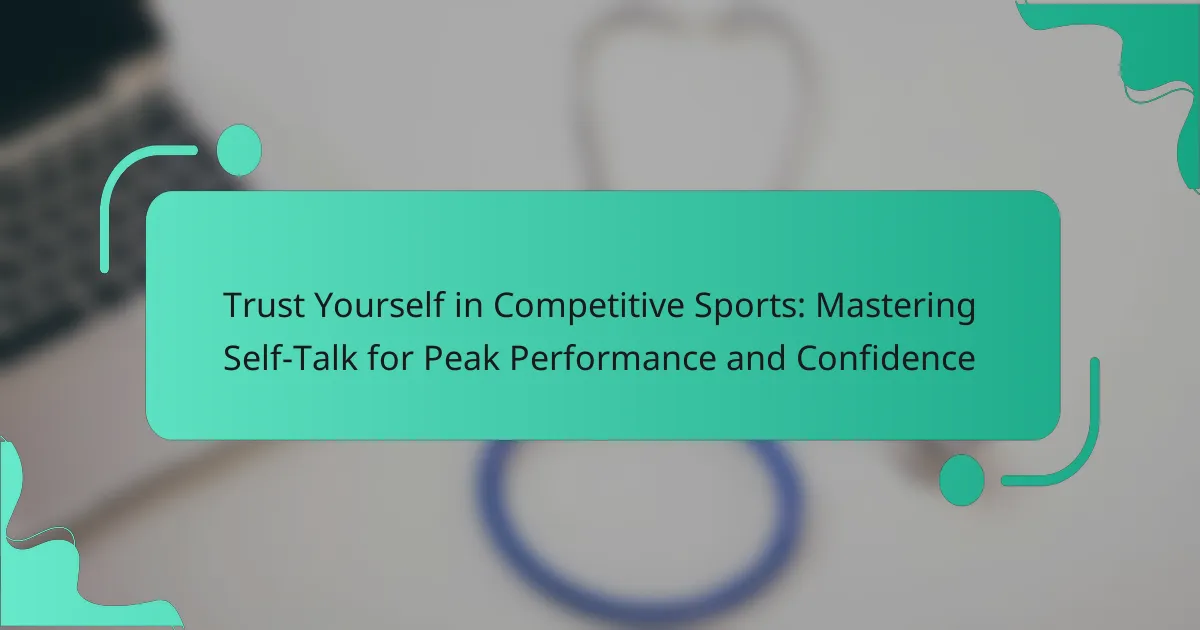Trusting yourself in competitive sports is crucial for achieving peak performance and confidence. This article explores how self-talk enhances focus and manages stress, the strategies for mastering positive affirmations and visualization, and common mistakes that hinder performance. By implementing effective self-talk techniques, athletes can cultivate resilience and improve their overall outcomes in competition.

How Does Self-Talk Influence Performance in Competitive Sports?
Self-talk significantly enhances performance in competitive sports by fostering confidence and focus. Positive self-talk helps athletes manage stress and anxiety, leading to improved outcomes. Research indicates that athletes who engage in constructive self-dialogue experience heightened motivation and resilience. For example, studies show that using affirmations can boost performance metrics by up to 20%. By mastering self-talk, athletes cultivate a mindset that promotes peak performance.
What Are the Different Types of Self-Talk?
Self-talk in competitive sports can be categorized into three main types: positive self-talk, negative self-talk, and instructional self-talk. Positive self-talk boosts confidence and motivation, negative self-talk can hinder performance, and instructional self-talk focuses on technique and strategy. Each type influences an athlete’s mindset and performance differently.
Why Is Positive Self-Talk Essential for Athletes?
Positive self-talk is essential for athletes as it enhances confidence and performance. It helps athletes focus on their strengths and abilities, reducing anxiety and self-doubt. Research shows that positive self-talk can improve resilience, leading to better outcomes in competitive situations. Athletes who practice this consistently report increased motivation and a stronger belief in their capabilities, which are critical for peak performance.
What Are the Benefits of Positive Self-Talk?
Positive self-talk enhances performance and confidence in competitive sports. It boosts motivation, reduces anxiety, and fosters resilience. Athletes using positive self-talk report improved focus and better overall results. This technique can transform mindset, leading to peak performance.
How Does Self-Talk Affect Mental Resilience?
Self-talk significantly enhances mental resilience by promoting positive thinking and self-belief. Athletes who engage in constructive self-talk can better manage stress and maintain focus during competition. Research indicates that affirmations and motivational phrases can improve performance and increase confidence. For instance, a study found that athletes using positive self-talk reported higher levels of self-efficacy and resilience in high-pressure situations. This mental strategy transforms challenges into opportunities for growth, fostering a competitive edge.

What Unique Strategies Can Athletes Use to Master Self-Talk?
Athletes can master self-talk through strategies like positive affirmations, visualization, and reframing negative thoughts. Positive affirmations boost confidence and reinforce self-belief. Visualization allows athletes to mentally rehearse success, enhancing focus and reducing anxiety. Reframing negative thoughts transforms challenges into opportunities for growth, promoting resilience. These unique strategies support peak performance by fostering a trusting mindset in competitive sports.
How Can Visualization Enhance Self-Talk?
Visualization significantly enhances self-talk by creating a mental environment that fosters confidence and focus. Athletes can visualize successful performances, which reinforces positive self-talk and reduces anxiety. This practice allows for the internal dialogue to align with desired outcomes, promoting peak performance. Studies indicate that visualization can improve athletic performance by up to 20%, demonstrating its effectiveness in competitive sports. By integrating visualization techniques, athletes can master self-talk, ultimately building trust in their abilities.
What Role Does Affirmation Play in Building Confidence?
Affirmation significantly boosts confidence in competitive sports by reinforcing positive self-talk. This practice helps athletes focus on strengths, enhancing mental resilience and performance. Research shows that athletes who engage in consistent affirmation experience lower anxiety levels and improved self-efficacy. By cultivating a positive mindset through affirmation, athletes can overcome challenges and achieve peak performance.
How Can Athletes Create Personalized Self-Talk Scripts?
Athletes can create personalized self-talk scripts by focusing on affirmations that resonate with their specific goals and challenges. Start by identifying key performance indicators relevant to your sport. Next, craft positive statements that reinforce your abilities and commitment. For example, use phrases like “I am strong” or “I can overcome obstacles.” Regularly practice these scripts to enhance confidence and mental resilience during competition. Tailor your language to reflect personal experiences and aspirations for maximum impact.

What Rare Techniques Exist for Optimizing Inner Dialogue?
To optimize inner dialogue in competitive sports, utilize rare techniques like visualization, mantra repetition, and cognitive restructuring. Visualization involves mentally rehearsing performance scenarios, enhancing confidence and focus. Mantra repetition uses positive affirmations to reinforce self-belief, while cognitive restructuring challenges negative thoughts, replacing them with constructive perspectives. These methods cultivate a resilient mindset essential for peak performance.
How Can Mindfulness Practices Enhance Self-Talk?
Mindfulness practices enhance self-talk by promoting positive thinking and emotional regulation. These techniques help athletes cultivate awareness of their inner dialogue, reducing negative self-talk and fostering self-compassion. Research indicates that mindfulness can improve performance by increasing focus and reducing anxiety. Athletes who practice mindfulness report greater confidence and resilience, which are crucial for peak performance. Incorporating mindfulness into training routines can lead to a more constructive and empowering self-talk, ultimately enhancing competitive outcomes.
What Are the Impacts of Self-Talk on Team Dynamics?
Self-talk significantly influences team dynamics by enhancing communication and collaboration. Positive self-talk fosters individual confidence, which translates into improved teamwork. As a result, athletes who engage in constructive self-dialogue often experience heightened trust among teammates, leading to better performance outcomes. Studies show that teams with higher levels of mutual trust can achieve up to 20% more in collective performance metrics.
How Can Athletes Support Each Other’s Self-Talk?
Athletes can support each other’s self-talk by fostering a positive and encouraging environment. This builds trust and enhances confidence among teammates. Sharing personal experiences with self-talk can help athletes understand its impact on performance. Regularly providing constructive feedback reinforces positive affirmations, making self-talk a collective effort. Engaging in group discussions about mental strategies can further solidify this support system.

What Are Common Mistakes Athletes Make with Self-Talk?
Athletes often make mistakes with self-talk that hinder performance. Common errors include negative self-talk, unrealistic expectations, and focusing on outcomes rather than processes. Negative self-talk can create self-doubt, while unrealistic expectations lead to unnecessary pressure. Focusing solely on outcomes may distract from the necessary steps to achieve goals. Recognizing and correcting these mistakes can enhance confidence and overall performance.
How Can Negative Self-Talk Undermine Performance?
Negative self-talk can significantly undermine performance in competitive sports by eroding confidence and focus. It creates a cycle of doubt, leading to decreased motivation and increased anxiety. Athletes who engage in negative self-talk may experience impaired decision-making and reduced resilience during competitions. This detrimental mindset can manifest as self-criticism or fear of failure, ultimately impacting overall performance. By recognizing and reframing negative thoughts, athletes can enhance their mental state and foster a more positive approach, leading to improved outcomes.
What Are the Signs of Ineffective Self-Talk?
Ineffective self-talk often manifests as negative thoughts, self-doubt, and critical inner dialogue. These signs can undermine confidence and hinder performance in competitive sports. Common indicators include persistent feelings of inadequacy, excessive focus on mistakes, and comparison to others. Recognizing these patterns is crucial for athletes aiming to master self-talk and enhance their peak performance.

How Can Athletes Effectively Implement Self-Talk Techniques?
Athletes can effectively implement self-talk techniques by using positive affirmations, visualization, and specific goal-setting. These methods enhance confidence and focus during competition.
Positive affirmations involve repeating encouraging phrases that reinforce belief in one’s abilities, such as “I am strong and capable.” Visualization techniques include mentally rehearsing successful performances, which can boost confidence and reduce anxiety. Setting specific, measurable goals helps athletes maintain focus and motivation, allowing them to track progress and celebrate achievements.
Incorporating these self-talk strategies into daily training routines can lead to improved mental resilience and performance under pressure. Research indicates that athletes who engage in structured self-talk exhibit enhanced concentration and reduced performance anxiety, ultimately leading to peak performance.
What Daily Practices Can Enhance Self-Talk?
To enhance self-talk in competitive sports, practice positive affirmations, visualization techniques, and mindfulness. These daily practices foster confidence and reinforce a positive mindset.
Positive affirmations involve repeating encouraging phrases that build self-belief. Visualization techniques entail mentally rehearsing successful performances, which can enhance focus and reduce anxiety. Mindfulness practices, such as meditation, help athletes stay present and manage negative thoughts effectively.
Incorporating these strategies into your routine can lead to improved performance and greater self-trust in competitive settings. Consistency is key; make these practices a part of your daily regimen for optimal results.
How Can Coaches Support Athletes in Improving Self-Talk?
Coaches can significantly enhance athletes’ self-talk by fostering a supportive environment and providing tailored feedback. This approach builds athletes’ confidence and encourages positive internal dialogues.
Establishing trust is crucial; athletes need to feel safe sharing their thoughts. Coaches can conduct regular one-on-one sessions to discuss mental strategies and reinforce positive self-talk.
Incorporating visualization techniques can also aid athletes in mastering self-talk. By visualizing successful performances, athletes create a mental framework that promotes confidence and reduces anxiety.
Finally, coaches should model positive self-talk themselves. Demonstrating how to reframe negative thoughts into constructive ones sets a powerful example for athletes to follow.
What Are the Best Practices for Sustaining Positive Inner Dialogue?
To sustain positive inner dialogue in competitive sports, focus on self-affirmation, visualization, and reframing negative thoughts. These practices enhance confidence and performance.
Self-affirmation involves repeating positive statements that reinforce your abilities. This builds a strong mental foundation. Visualization is imagining successful performances, which prepares the mind for real situations. Reframing negative thoughts into constructive ones helps maintain focus and motivation.
Regularly practicing these techniques can lead to improved self-talk, ultimately resulting in peak performance. Remember, consistency is key in mastering self-talk for confidence in competitive sports.
